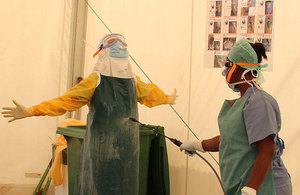Update on Ebola response
Britain will continue to provide the leadership and resources Sierra Leone needs to contain and control Ebola.

A healthworker is sprayed down to kill off any traces of Ebola at the British-built Makeni treatment centre. Picture: Jessica Seldon/DFID
Britain’s strategy in Sierra Leone has centred on making burials safe, increasing the number of available treatment beds and changing behaviour so people suspected of having Ebola seek treatment early. The UK will continue to ensure sufficient resources are available to tackle the outbreak.
The UK’s updated support will provide:
1. Treatment centres
The UK is currently supporting more than 1,470 treatment and isolation beds in Sierra Leone, including in the UK’s 6 purpose-built Ebola treatment centres. In order to keep these vital centres running, a further £60.5 million has been made available.
2. Western Area Surge
The ongoing Western Area Surge, led by the government of Sierra Leone, has seen a huge effort to track down hidden cases of Ebola and encourage people to present early. As well as logistical support, the UK has provided vehicles to be used by home decontamination teams and has established an ambulance and decontamination cleaning site at Hastings.
There are now enough telephone hotline workers, tracers, laboratory systems for carrying out tests, ambulances, treatment beds and staff, burial teams, as well as people to coordinate, find and fix problems as they arise. £7 million will ensure that priorities such as fleet management and continued surveillance flagged as a result of the surge can be responded to quickly and effectively.
3. Regional preparedness strategy
The international community and region itself would struggle to cope with an epidemic in another African country. To help prevent this, the Department for International Development (DFID) is ensuring that our health programmes in high risk countries such as Ghana and Ethiopia, along with multilateral partners, actively support national emergency planning as part of a £25 million regional preparedness strategy.
Notes to editors
- This additional £92.5 million takes the UK’s total contribution to £325 million.
- The World Health Organisation (WHO) has led preparedness missions to assess the state of preparedness of 14 “at risk” African countries: Benin, Burkina Faso, Cameroon, Central African Republic, Cote d’Ivoire, Ethiopia, Gambia, Ghana, Guinea Bissau, Mali, Mauritania, Niger, Senegal and Togo.
- The reports of the missions are published on World Health Organisation Ebola web site: http://www.who.int/csr/disease/ebola/en/
General media queries (24 hours)
Email mediateam@dfid.gov.uk
Telephone 020 7023 0600
If you have an urgent media query, please email the DFID Media Team on mediateam@dfid.gov.uk in the first instance and we will respond as soon as possible.